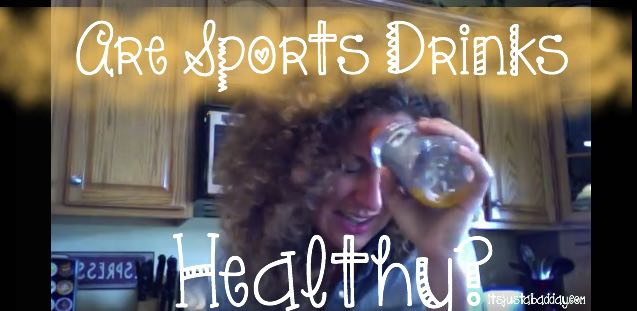Let’s talk about electrolytes!
According to Reboot with Joe, Electrolytes are important nutrients for our bodies as they play key roles in sending electrical impulses that influence our heart, muscles and nerves. They also play an important role in fluid balance and hydration in our cells, tissues, and our muscles. Lack of sufficient electrolytes can contribute to muscle cramps, delayed muscle soreness and spasms following exercise and for some can contribute to headaches. (Check out the whole post here!)
So, needless to say, they’re important to have in our diet.
What’s the first thing you think of when you hear electrolytes?
Growing up I was always told to replenish mine by drinking a sport drink, like gatorade. Especially when I was sick with the stomach flu or pretty dehydrated.
A wonderful blog follower asked me if Gatorade is a good option for replenishing your electrolytes and today’s Ask Juls video tackles that question.
SPOILER ALERT: NOOOOOOOOOO!!!!!!!!!!
Watch this video to find out more:
Instead of reaching for a gatorade, try one of these options instead:
Organic Coconut Water
Coconut water is the ONLY “sports drink” Dr. Mercola recommends! The following has been taken from his article entitled ‘Why Coconut Water Is The Only Sports Drink I Recommend‘:
 Coconut water has five electrolytes your body needs:
Coconut water has five electrolytes your body needs:
- Potassium: The most important positive ion (cation) inside your cells; potassium regulates heartbeat and muscle function. Coconut water contains 295 mg, which is 15 times the amount in the average sports drink
- Sodium: The most important positive ion in fluid outside your cells, and also the one most depleted with exercise, as you lose sodium through sweat and urine
- Magnesium: important for maintaining the electrical potential of your clls, proper muscle function, and preventing calcium overload
- Phosphorus: Plays important roles in bone health, but also in transferring energy throughout your body, helping your muscles contract, and regulating nerve function (partners with calcium)
- Calcium: Important for bone health (partners with phosphorous)
Want more proof? Dr. Axe, in his article Is Coconut Water Good For You said the following:
Because coconut water is high in potassium, and such a great electrolyte replacement, it has even been used for IV hydration in certain emergency situations. (4) It is also lower in carbohydrates compared to other sports drinks. Coconut water is only about 4.5% carbohydrates whereas other sports drinks can contain 6-8% carbohydrate concentration. This is good for athletes trying to watch their sugar intake and hydrate after an event. For most casual exercisers coconut water is a great low-sugar hydration choice for after a workout.
A 2002 study, compared water, coconut water, and standard sports beverages to determine which beverage was best for post-exercise hydration. The eight subjects exercised in the heat and then were rehydrated with either water, coconut water, or a sports drink.
Researchers found that there was no difference in sodium levels, urine output, or fluid balance between the three beverages, meaning all three beverages were equally hydrating. But, there was significantly less nausea or fullness with the coconut water allowing the participants to drink more of the beverage. (5)
Overall, coconut water can be an alternative to sports drinks, but it may depend on the type of sport and the intensity. Some long-distance endurance athletes may need more specialized products that contain more sodium and carbohydrates. But, for most casual exercisers, coconut water is a great option.
Banana
Above I showed you the different electrolytes, so what is so great about bananas? Welllllll, according to Healthy Eating,
[su_pullquote align=”right”]
Want to make your own drink?
Try these DIY 2 delicious electrolyte replenishing drinks!
[/su_pullquote]
Potassium
Bananas are one of the best sources of potassium, with one large banana providing 10 percent of the recommended daily intake. Potassium forms a positively charged ion that’s found primarily inside cells. Its concentration is 10 times higher inside cells than the amount of potassium outside cells. It works opposite of sodium, which is a positive ion in higher concentrations in fluids outside cells. Their unbalanced concentrations form an electrical difference used to create the electrical impulses critical for muscle contraction, heart function and nerve impulse transmission. Specialized pumps in the cell walls, sodium-potassium pumps, constantly move the two electrolytes into and out of cells to maintain the right concentration. The energy used by the pumps accounts for 20 to 40 percent of the calories you burn even while resting.
Magnesium
Magnesium primarily functions inside the cells, where it’s the second most plentiful positively charged ion. Magnesium is needed for proper functioning of the pumps that maintain the balance of sodium and potassium. Other pumps that regulate the movement of calcium in and out of cells also rely on magnesium. More than 300 enzymes need magnesium to complete their jobs, including energy metabolism and protein synthesis. One large banana delivers 9 percent of the recommended daily intake of magnesium.
Phosphorus
In addition to combining with calcium to form bones, phosphorus forms a negatively charged ion that works mostly inside cells to create energy and build cell walls. It’s an essential component of many biochemical reactions, including those that create deoxyribonucleic acid, or DNA, which carries genetic information. Phosphorus serves as a buffer that protects your blood from sudden changes in its acid-base balance. You’ll get 4 percent of the recommended daily intake of phosphorus from one large banana.
Want to know more and find out a few more ways to replace your electrolytes sans Gatorade? Check out Food Babe’s The Secret Behind Gatorade & How to Replenish Electrolytes Naturally!
So next time you’re not feeling well or you want to replenish your body, turn to a whole food, organic, HEALTHY option instead of a sugar, toxic sports drink.
Wishing You A Pain Free Day!


